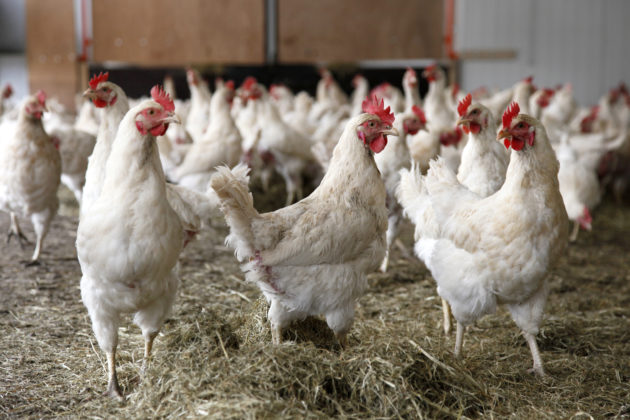
BC privacy commissioner says chicken catching company can’t surveil employees
Food in Canada
Food In Canada Business Operations Food Safety Regulation Meat &Poultry animal abuse surveillanceWhile animal advocacy group Mercy For Animals is calling on more video surveillance on farms and slaughterhouses in Canada, BC's privacy commissioner says it's not the solution and often unlawful
 chickens walking around in barn with hay
chickens walking around in barn with hay Victoria, BC – BC’s privacy commissioner says the Fraser Valley, BC-based chicken catching company whose employees were caught on video abusing the animals cannot have employees wearing body cameras at all times.
In June of this year, Mercy For Animals, an animal advocacy organization, released undercover video of employees at Elite Services – a Lilydale chicken supplier – severely abusing animals.
In a statement, Mercy For Animals says the videos “exposed extreme animal abuse by workers at more than a dozen Elite Services facilities.”
Some of the abuse included:
- Punting and throwing birds
- Slamming birds against walls and into transport crates
- Ripping the legs off conscious animals
- Attempting to rip a bird in half with bare hands
- Tormenting animals in sexually explicit ways
Drew McArthur, BC’s Acting Information and Privacy Commissioner, released a report on the incident and says in a statement that Elite Services “was not authorized by the Personal Information Protection Act (PIPA) to collect the personal information of employees, farmers and other contractors via video and audio surveillance.”
The Office of the Information & Privacy Commissioner for BC says that after the undercover video emerged, media began reporting that Elite Services had announced it would have employees wear the body cameras. According to those media reports, a crisis management firm had counselled Elite Services to install the cameras. This prompted the privacy commissioner to “initiate the investigation.”
McArthur says in the statement that businesses often resort to cameras as a way to solve a business problem. “But it’s rarely effective in solving those problems, and worse, it’s often unlawful,” he says.
“In this case, the organization should have avoided employee misconduct by implementing less privacy invasive measures, such as improving hiring, training and supervision practices. Merely implementing surveillance afterward, when those responsible had been terminated, was ill-considered. Organizations should know that any surveillance measures must be reasonable and authorized by PIPA.”
Mercy For Animals had its own response to McArthur.
The non-profit says in its statement that the privacy commissioner “allow video recording inside farms and slaughterhouses in order to prevent egregious animal cruelty. Further, Mercy For Animals is urging Elite Services not just to equip workers with body cameras but to live-stream to the Internet and/or to a third-party auditing firm.”
Krista Hiddema, vice-president of Mercy For Animals, says in the statement that animal abuse is a widespread problem in Canada in the meat, dairy and egg industries.
“Animals are confined in barren cages; mutilated without pain relief; violently shackled; shocked; and slit open at the throat while alive and fully conscious,” she says. “Every farm and slaughterhouse in Canada should install video monitoring systems and live-stream the footage to the Internet or a third-party auditing firm to help prevent animal cruelty and increase transparency in food production.”
Print this page